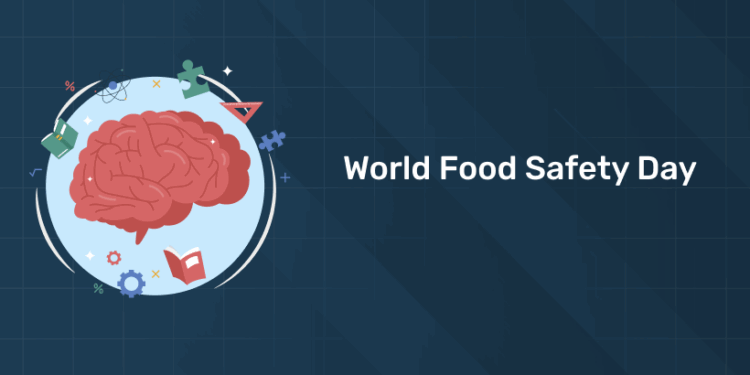Table of Contents
Food safety is a global concern that covers several areas of everyday life. Access to enough healthy food is essential for sustaining life and maintaining good health. Food Safety refers to handling, preparing, and storing food to best reduce the risk of individuals becoming sick from foodborne illnesses. Due to the rush and bustle of daily life, we frequently fail to consider food safety, which led to an increase in the number of people diagnosed with foodborne illnesses globally. Every year on June 7, we observe World Food Safety Day to raise awareness and mobilize efforts to prevent, identify, and manage foodborne risks and promote human health.
World Food Safety Day 2025 Date – June 7
In this article readers can get a glimpse on
- History and Observance of World Food Safety Day
- World Food Safety Day Theme 2025
- World Food Safety Day Quiz
History of World Food Safety Day
1: Who was the first woman President of India?
It all began at the 39th session of Codex Alimentarius Commission held in 2016, a proposal to promote a particular day to celebrate Food Safety within the framework of the United Nations was agreed. Later in the 40th Session of the FAO Conference held in July 2017, a resolution in support of World Food Safety Day was adopted and the World Health Organization expressed their support in December 2017. A proposal to establish a particular day for Food Safety went before the Second Committee of the 73rd session of the United Nations General Assembly. Following their October/November 2018 discussion, it was approved and went before the General Assembly for final adoption. Then on 20 December 2018 the United Nations General Assembly adopted resolution 73/250 announcing to celebrate every 7th June as World Food Safety Day. The first World Food Safety Day was celebrated on June 7, 2019.
Free UPSKILLING Courses!
Take your first step toward mastering in-demand skills, acing interviews, and securing top-tier jobs with Entri's free upskilling courses.
Start Learning!World Food Safety Day Theme 2025
On June 7, 2025, the global community will unite to observe World Food Safety Day under the compelling theme, “Food Safety: Science in Action.” This powerful slogan underscores the indispensable role of scientific rigor and innovation in safeguarding the food we consume, from farm to fork. As the world increasingly grapples with complex food systems, climate change impacts on agriculture, and emerging foodborne threats, the emphasis on scientific principles has never been more critical.
The theme “Food Safety: Science in Action” highlights how scientific knowledge and methodologies are the bedrock of effective food safety management. It encompasses a vast array of disciplines, including:
- Microbiology: Understanding and controlling pathogenic bacteria, viruses, and parasites that can contaminate food and cause illness.
- Chemistry: Identifying and mitigating chemical hazards, such as pesticides, heavy metals, and food additives, ensuring they remain within safe limits.
- Toxicology: Assessing the potential adverse health effects of substances in food and establishing safe exposure levels.
- Epidemiology: Investigating outbreaks of foodborne illnesses to identify their sources, understand transmission routes, and prevent future occurrences.
- Food Engineering and Technology: Developing safe processing, packaging, and preservation methods that maintain food quality and prevent spoilage.
- Risk Assessment and Management: Applying scientific frameworks to evaluate potential food safety risks and implement effective control measures throughout the supply chain.
This year’s theme serves as a call to action for governments, industries, academia, and consumers alike. It encourages:
- Investment in Food Safety Research: Promoting further scientific inquiry to address new and evolving food safety challenges.
- Evidence-Based Policymaking: Ensuring that food safety regulations and standards are grounded in sound scientific evidence.
- Innovation in Food Production: Encouraging the adoption of scientific advancements that enhance food safety and sustainability.
- Public Awareness of Scientific Principles: Educating consumers about the science behind safe food handling, storage, and preparation.
Ultimately, “Food Safety: Science in Action” aims to illustrate how scientific insights translate into tangible benefits: fewer foodborne illnesses, reduced economic burdens associated with unsafe food, and most importantly, the protection of public health and lives. It reinforces the message that food safety is not merely a regulatory compliance issue, but a dynamic field driven by continuous scientific discovery and application for a healthier and more secure food future.
World Food Safety Day Previous Themes
World Food Safety Day, observed annually on June 7, was established by the United Nations General Assembly in 2018. Jointly facilitated by the Food and Agriculture Organization of the United Nations (FAO) and the World Health Organization (WHO), the day aims to draw attention to the importance of food safety for human health, economic prosperity, agriculture, tourism, and sustainable development.
Each year, a specific theme is chosen by the FAO and WHO to highlight a particular aspect of food safety. Here are the themes from recent years:
- 2019: “Food safety, everyone’s business” (This was the inaugural theme).
- 2020: “Food safety, everyone’s business” (The theme was carried over from the previous year).
- 2021: “Safe food today for a healthy tomorrow”
- 2022: “Safer food, better health”
- 2023: “Food standards save lives”
- 2024: “Food safety: prepare for the unexpected”
World Food Safety Day 2025
June 7 each year is marked globally by the ‘World Food Safety Day’ as per the World Health Organization (WHO). Unsafe or Unhygienic food can cause food borne illness causing hazardous effect on human health. Access to safe food is each and every individual’s right. Thus, Food safety is everybody’s responsibility, whether it is growing, exporting, storing, selling, serving or consuming food. Food safety is a shared responsibility between governments, producers and consumers. Thus everyone must take part in this initiation by WHO by promoting awareness and urging action by highlighting what everyone can do to ensure food safety. Every single individual must ensure the safety of food from farm to dinner table.
By celebrating this day, WHO pursues its efforts to mainstream food safety in the public agenda and reduce the burden of food-borne diseases globally. An estimated three million people around the world die every year from food and waterborne in developed and developing countries. Around 600 million cases of food-borne illnesses annually have made United Nations to take a step towards food safety, linking together many of the Sustainable Development Goals, like eradicating hunger, preventing diseases, promoting a fair trade and improving sustainable agriculture.
Free UPSKILLING Courses!
Take your first step toward mastering in-demand skills, acing interviews, and securing top-tier jobs with Entri's free upskilling courses.
Start Learning!World Food Safety Day 2025: How can you celebrate?
World Food Safety Day 2025 is a great opportunity to raise awareness about the importance of safe food practices. Whether you’re an individual, educator, health worker, or part of an organization, you can contribute to the cause in creative and meaningful ways. Celebrations can be conducted both in-person and virtually, depending on your setting. This is your chance to showcase your initiatives, promote safer food habits, and engage your community in protecting health through food safety.
Here are some impactful ways to celebrate World Food Safety Day 2025:
-
Host workshops or webinars on hygiene, safe cooking, or food handling.
-
Launch a local awareness campaign in schools, markets, or community centers.
-
Organize expert talks on foodborne illnesses and safety regulations.
-
Share stories of farmers, food workers, or health professionals to highlight safe practices.
-
Create art, posters, or games centered on the food safety message.
-
Hold online panels or live Q&A sessions with food safety experts.
-
Use social media platforms like Facebook, Instagram, and Twitter to go live or post tips. You can tag @WHO, @FAO, and @FAOWHOCodex using the hashtag #WorldFoodSafetyDay.
-
Conduct interviews with chefs, farmers, or health workers who follow strong food safety practices.
-
Organize creative events such as community clean-ups of food areas or healthy recipe contests.
Let your celebration inspire others to take action for safer food and better health!
Did You Know?
- One in ten people worldwide fall ill from contaminated food each year.
- Eating food infected with germs, viruses, parasites, or chemical compounds such as heavy metals can cause over 200 ailments.
- Foodborne parasitic diseases can cause both acute and chronic health problems. The estimated number of illnesses from 11 main parasitic diseases is 48.4 million per year, 48 percent of which are transmitted through food.
- The health of animals, plants, and the environment in which food is produced have an impact on its safety. A better food safety system can be achieved by adopting a holistic One Health approach to food safety.
- The production of safe food reduce the chance of food loss and waste
World Food Safety Quiz 2025
A) 100,000
B) 250,000
C) 600,000
3. Which group is most vulnerable to unsafe food globally?
A) Adults over 30
B) Teenagers
C) Children under 5
A) $50 billion
B) $75 billion
C) $95 billion
5. Which global body develops food safety standards and guidelines?
A) Codex Alimentarius Commission
B) World Food Programme
C) WTO Agriculture Committee
A) Listeria
B) Salmonella
C) E. coli
A) Once before cooking
B) Only after eating
C) Before, during, and after food prep
A) 63°C
B) 74°C
C) 85°C
A) Leave at room temperature
B) Store in open containers
C) Refrigerate within two hours
Want More Engaging Questions?
Download our FREE PDF packed with insightful quiz questions to test your knowledge!
🔽 Click below to get your free copy now! 🔽
World Food Safety Day Quiz 2025 PDF
World Food Safety Day 2025 serves as a powerful reminder that safe food is essential for good health and well-being. It encourages everyone—from farmers and food handlers to consumers and policymakers—to recognize their role in keeping food safe. With foodborne illnesses affecting millions each year, this global observance helps unite communities in efforts to reduce risks and strengthen food systems. Promoting hygiene, proper storage, and responsible consumption can significantly lower the chances of contamination.
By participating in awareness activities, spreading knowledge, and supporting safer food practices, we can help create a healthier future for all. Whether online or offline, every contribution counts toward building a stronger food safety culture. As we celebrate this important day in 2025, let us commit to protecting our food at every step—from farm to table. Together, we can ensure that everyone has access to safe, nutritious food every day.
Free UPSKILLING Courses!
Take your first step toward mastering in-demand skills, acing interviews, and securing top-tier jobs with Entri's free upskilling courses.
Start Learning!Frequently Asked Questions
What is the purpose of World Food Safety Day?
World Food Safety Day raises awareness about foodborne risks. It encourages efforts to prevent, detect, and manage food safety hazards. The goal is to ensure food is safe at every stage of the supply chain. It highlights the importance of clean, nutritious, and safe food for good health. Everyone from producers to consumers plays a role in maintaining food safety.
Who organizes World Food Safety Day globally?
World Food Safety Day is jointly organized by the World Health Organization (WHO) and the Food and Agriculture Organization (FAO) of the United Nations. These agencies promote international food safety standards. They also work with governments and food industry leaders worldwide. Their efforts aim to reduce foodborne illnesses and support sustainable development. Global participation ensures consistent food safety measures.
How does unsafe food affect people’s health?
Unsafe food can carry harmful bacteria, viruses, or chemicals. These contaminants can cause foodborne illnesses, leading to diarrhea, fever, or more serious diseases. Vulnerable groups like children, pregnant women, and the elderly face higher risks. Some cases may result in long-term health issues or death. Ensuring food safety helps prevent millions of avoidable illnesses every year.
Why is food safety important for economic development?
Foodborne illnesses cost countries billions of dollars annually in lost productivity. Unsafe food affects tourism, trade, and healthcare systems. Small businesses and farmers also suffer when food safety issues arise. Investing in food safety improves consumer trust and economic stability. Safer food systems help countries grow sustainably and reduce poverty.
What are common causes of food contamination?
Contamination can occur at any stage from farm to fork. Common causes include poor hygiene, unsafe water, and improper food storage. Cross-contamination between raw and cooked foods also spreads bacteria. Lack of awareness and weak regulations worsen the problem. Education and infrastructure can reduce most of these risks.
How can individuals ensure food safety at home?
People can follow the “Five Keys to Safer Food” by WHO. These include keeping food clean, separating raw and cooked items, cooking thoroughly, storing food at safe temperatures, and using safe water. Washing hands and surfaces often prevents germs from spreading. Using a food thermometer ensures proper cooking. Responsible handling makes meals safer for everyone.
What role do governments play in food safety?
Governments enforce food safety laws and monitor food quality. They support education, regulation, and inspection systems. By working with international agencies, they align with global standards. They also respond to outbreaks and food-related emergencies. Strong governance ensures safer food for the population.
What are some global efforts to promote food safety?
Organizations like WHO and FAO promote international food safety through the Codex Alimentarius. Campaigns on World Food Safety Day educate the public. Many countries now have national food control systems. Research and data collection help track foodborne diseases. Global cooperation strengthens food safety frameworks.
How does food safety connect to the Sustainable Development Goals (SDGs)?
Food safety supports SDG 2 (Zero Hunger) and SDG 3 (Good Health and Well-being). Safe food ensures better nutrition and reduces preventable illness. It also supports SDG 12 (Responsible Consumption and Production). Strengthening food systems benefits health, the economy, and the environment. Food safety is crucial for achieving long-term development goals.
How can schools and communities participate in World Food Safety Day?
They can host awareness campaigns, food safety workshops, or clean kitchen challenges. Schools can teach children about hygiene and safe eating habits. Local food businesses can showcase best practices in food handling. Social media campaigns help spread key messages widely. Community action strengthens the culture of food safety.













